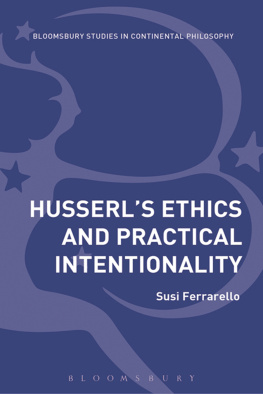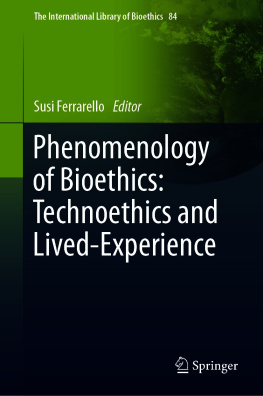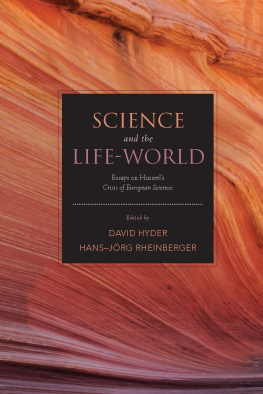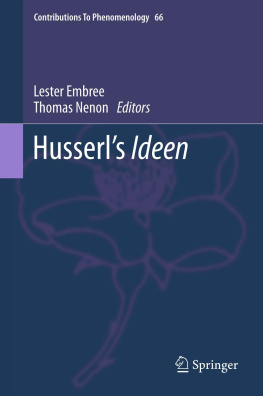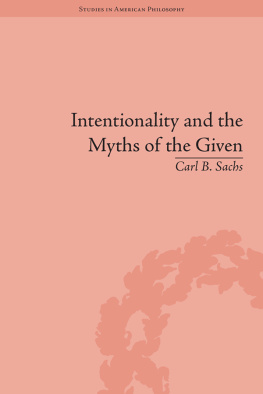Susi Ferrarello - Husserls Ethics and Practical Intentionality
Here you can read online Susi Ferrarello - Husserls Ethics and Practical Intentionality full text of the book (entire story) in english for free. Download pdf and epub, get meaning, cover and reviews about this ebook. year: 2016, publisher: Bloomsbury UK, genre: Romance novel. Description of the work, (preface) as well as reviews are available. Best literature library LitArk.com created for fans of good reading and offers a wide selection of genres:
Romance novel
Science fiction
Adventure
Detective
Science
History
Home and family
Prose
Art
Politics
Computer
Non-fiction
Religion
Business
Children
Humor
Choose a favorite category and find really read worthwhile books. Enjoy immersion in the world of imagination, feel the emotions of the characters or learn something new for yourself, make an fascinating discovery.
- Book:Husserls Ethics and Practical Intentionality
- Author:
- Publisher:Bloomsbury UK
- Genre:
- Year:2016
- Rating:5 / 5
- Favourites:Add to favourites
- Your mark:
- 100
- 1
- 2
- 3
- 4
- 5
Husserls Ethics and Practical Intentionality: summary, description and annotation
We offer to read an annotation, description, summary or preface (depends on what the author of the book "Husserls Ethics and Practical Intentionality" wrote himself). If you haven't found the necessary information about the book — write in the comments, we will try to find it.
Husserls Ethics and Practical Intentionality — read online for free the complete book (whole text) full work
Below is the text of the book, divided by pages. System saving the place of the last page read, allows you to conveniently read the book "Husserls Ethics and Practical Intentionality" online for free, without having to search again every time where you left off. Put a bookmark, and you can go to the page where you finished reading at any time.
Font size:
Interval:
Bookmark:

Husserls Ethics and
Practical Intentionality
Also available from Bloomsbury
Epistemology, Archaeology, Ethics: Current Investigations of Husserls Corpus , edited by Pol Vandevelde and Sebastian Luft
The Ethics of Husserls Phenomenology , Joaquim Siles i Borrs
Flesh and Body: On the Phenomenology of Husserl , Didier Franck
Husserl: A Guide for the Perplexed , Matheson Russell
The Husserl Dictionary , Dermot Moran
Husserls Phenomenology , Kevin Hermberg
To my husband Marc
Husserls Ethics and
Practical Intentionality
Susi Ferrarello
Bloomsbury Academic
An imprint of Bloomsbury Publishing Plc

Contents
Husserl as an ethical thinker
Scholars consider Husserl a logical, mathematical and philosophical thinker for a variety of philological and biographical reasons. Originally a mathematician, the few complete books of Husserl published during his lifetime focused primarily on logic. Though he lectured and wrote extensive notes on the topic of ethics, his ethical work remained unpublished at the time of his death. Hence the common interpretation of Husserl as thinker primarily concerned with logic is understandable.
Yet without Husserl, the work of philosophers shaped by or in intimate dialogue with the phenomenological tradition such as Heidegger, Merleau-Ponty, Sartre, Levinas, Ricoeur, Gadamer, Stein and Scheler all of whom appear to be, so to speak, more interested in life would be inconceivable. In a more or less patent way a long list of contemporary thinkers is indebted to Husserls phenomenology. Differently from contemporary Husserl scholars, these philosophers breathed Husserls phenomenology through his and his assistants seminars, his manuscripts, his lectures and so forth. Indeed the best-known work of such philosophers is in large measure the fruit of an ongoing dialoguing with Husserlian ideas a dialogue invisible sometimes to contemporary students who are unacquainted with his phenomenology.
This means that what came after Husserl existentialism, hermeneutics, philosophical and psychological theories of embodiment, formal and material ethics is not extraneous to his philosophy, rather is actively engaged with seminal ideas already present in his thought. Heideggers Dasein or Merleau-Pontys corps, while not bearing a merely derivative resemblance to Husserls work, would not have been possible without Husserls teaching and manuscripts. All this is to say that it would be reductive to label Husserls work as an intellectualist, formalist and logical philosophy.
In particular Husserls interest in the human being, her life in the community, her decisions, her existence in relation to the life-world, and her relationship to God played an important role in the growth of his phenomenology. I suggest that he never published a complete volume concerning his ethical researches not because they were not relevant to his study, but because his amor cognoscendi, his passion for delving into the matter of his analysis as an eternal beginner, kept his research open and always a step behind his ideals.
Husserls ethical project is not just a limited exploration, but is a full ethical standpoint as imperfect and open as his logic is. In the same way in which he repeatedly came back to his logic to refine its structure, so he did for his ethics. I do not think that he would consider the logic of Experience and Judgment or Transcendental and Formal Logic his last word on logic, and likewise for his ethics. I think that the human afflatus of his writings inspired the research of his assistants and inheritors and we should not let the richness of the phenomenological and hermeneutic contributions that came after Husserl prevent us from acknowledging what was already present in his writings.
The focus of this volume is Husserls original contributions to ethical philosophy. In order to make Husserls ethical voice stand out clearly, I have limited references to his successors as much as possible. Conducting this research I discovered a deeply human Husserl, concerned about existential problems essential for the understanding of the human (not only human) being. This book seeks to present his extremely rich ethical thought in an organized way.
Husserls ethics
It is not an easy task to tell the story of Husserls ethics, sorting out the moments of his thought according to a before and after, a cause and a consequence. Just as his logic cannot be fixed in one category, the same is true for his ethics. He began reflecting on ethics in 1889 more or less the same year as his logical studies and reworked his ethics throughout the course of his life.
In an imaginary world, a Scheler, acting like Landgrebe, would have transcribed and organized Husserls ethical notes in a book entitled Experience and Decision. Unfortunately, this never occurred. What we know about his ethics is completely post hoc ; it is the fruit of an interpretative, philological and What we know about his ethical writings comes first from the efforts of the community of scholars still active in Leuven transcribing and editing Husserls notes in order to publish them as volumes of the Husserliana, and second from interpreters of these volumes who seek to take a comprehensive philosophical view of his ethical writings.
This book is an extended interpretation of the ethical material in Husserls manuscripts, focusing mainly (but not exclusively) on volumes 28, 37 and 42 of the Husserliana and Materials 9. The picture of Husserls ethics that emerges from this inquiry is that of a two-faced Janus: Husserls ethics is both a science and a practice; it is a phenomenological ethics grounded into a specific region of being that he called volitional body, and a practical flow rising from the hyletic force of life. This distinction between science and practice should not be taken as a distinction in which practice is the practical application of the theory. Practice as a science is a living science that ontologically underpins science as a theoretical reflection. Belonging to this two-fold ethics is the practice of phenomenological ethics that is, the methodological praxis through which the phenomenologist clarifies the grounds of her ethical research and illuminates ethical phenomena.
Three premises
The following three premises and three related assertions are offered as an introduction to the problematic of Husserls ethics:
There is no one sole ethics.
There is no one sole method to describe this ethics.
There is no one sole means of ethical reflection.
As it concern the first premise, in the dichotomizing distinction used by Husserl himself between Natur and Geist, ethics occupies a place that is exactly in-between the two. Husserls ethics is an ethics of biological bodies ( Natur ) and an ethics of these bodies as reflective units ( Geist ). For this reason, the first distinction I propose in my systematization of Husserls ethical thought is between ethics as a practice and ethics as a theoretical science . Ethics is an embodied, practical answer to a situation, and simultaneously is a reflective hence theoretical analysis of our decision in response to that situation.
Nature and Spirit are considered by Husserl as two poles in the flow of what we might call living consciousness or time. Being and spirit represent two basic poles that give shape to human being. The two poles speak two different languages. The language of being differs from the language of spirit. On the one hand we have bodies, on the other minds. Despite the fact that these poles speak two different languages, they encounter each other and are the origin of our practical life. From this consideration, it follows that Husserls ethics must be described in accordance with the two-poles structure, hence the title Husserls Ethics and Practical Intentionality . On the one hand, there is the ethics of our bodies that is continuously in fieri . I named that ethics I believe with Husserls permission practical intentionality. On the other hand, there is the ethics of the mind and reflection, a meta-ethics that I called ethical science.
Font size:
Interval:
Bookmark:
Similar books «Husserls Ethics and Practical Intentionality»
Look at similar books to Husserls Ethics and Practical Intentionality. We have selected literature similar in name and meaning in the hope of providing readers with more options to find new, interesting, not yet read works.
Discussion, reviews of the book Husserls Ethics and Practical Intentionality and just readers' own opinions. Leave your comments, write what you think about the work, its meaning or the main characters. Specify what exactly you liked and what you didn't like, and why you think so.

